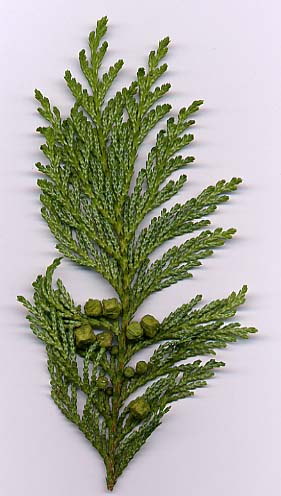
Chamaecyparis, common names cypress or false cypress, is a genus of conifers in the cypress family Cupressaceae, native to eastern Asia and to the western and eastern margins of the United States. The name is derived from the Greek khamai (χαμαί), meaning "on the earth", and kuparissos (κυπάρισσος) for "cypress".

Stewartia is a genus of 8-20 species of flowering plants in the family Theaceae, related to Camellia. Most of the species are native to eastern Asia in China, Japan, Korea, Laos, Myanmar, Thailand, and Vietnam, with two in southeast North America, from Virginia and Kentucky south to Florida and Louisiana.

Triadica is a plant genus of the family Euphorbiaceae first described as a genus in 1790. It is native to eastern southeastern, and southern Asia.

Gamblea is a genus of plants of the family Araliaceae, comprising four species. It originally comprised a single species, Gamblea ciliata, which is found in India.

Linnaea is a plant genus in the honeysuckle family Caprifoliaceae. Until 2013, the genus included a single species, Linnaea borealis. In 2013, on the basis of molecular phylogenetic evidence, the genus was expanded to include species formerly placed in Abelia, Diabelia, Dipelta, Kolkwitzia and Vesalea. However, this is rejected by the majority of subsequent scientific literature and flora.

Picea polita, synonym Picea torano, commonly known as the tigertail spruce, is a species of conifer in the family Pinaceae. It is native to Japan.
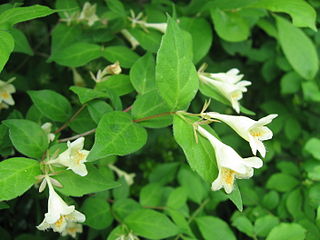
Linnaea spathulata, synonym Abelia spathulata, is a species of Linnaea in the honeysuckle family (Caprifoliaceae). The plant is endemic to Korea and Japan.

Zanthoxylum schinifolium, also called mastic-leaf prickly ash, is a species of flowering plant in the Rutaceae, the citrus family.
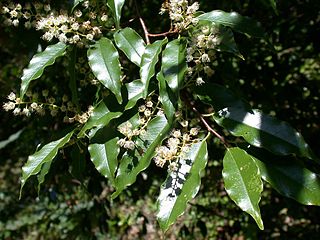
Prunus spinulosa is an evergreen species of cherry-laurel native to southeastern China and warmer parts of Japan. Its lustrous leaves superficially resemble those of holly. Individual trees can reach 20 m, and are typically found growing in places with high ambient humidity, such as forested areas near larger rivers.

Paederota is a genus of flowering plants in the family Plantaginaceae. It has only one species, Paederota bonarota, which grows only on dolomite in the Alps of Italy, Austria and Slovenia.

Acer distylum, the lime-leaved maple or linden leaved maple, is a species of flowering plant in the family Sapindaceae, native to north Honshu Island of Japan. Its closest relative is Acer nipponicum, with which it is grouped in the Acer section Parviflora. The species is noted for its 10–15 cm (4–6 in) unlobed leaves, the like of which are not found in any other maple species. The bark is grayish, and has a pink cast in young specimens. Acer distylum was first described by Philipp Franz von Siebold and Joseph Gerhard Zuccarini in 1845, and later brought to Europe by Charles Maries in 1879.

Meliosma rigida, the stiff-leaved meliosma, is a species of flowering plant in the family Sabiaceae. It is native to Laos, Vietnam, southern China, Taiwan, Japan, the Ryukyu Islands, and the Philippines.
Adina racemosa is a species of flowering plant belonging to the family Rubiaceae. It is a tree native to northern Myanmar and Thailand, southern China, Taiwan, the Ryukyu Islands, and Japan.
Schizocodon is a genus of flowering plants belonging to the family Diapensiaceae.

Phacellanthus is a monotypic genus of flowering plants belonging to the family Orobanchaceae. The only species is Phacellanthus tubiflorus.
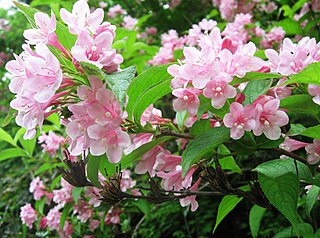
Weigela hortensis is a species of flowering plant in the family Caprifoliaceae, native to Hokkaido and Honshu islands of Japan. A rounded shrub reaching 10 ft (3 m), and hardy in USDA zones 6 through 9, it is occasionally found in commerce.
Circaea mollis is a species of flowering plant in the evening primrose family Onagraceae.

Wisteriopsis japonica is a species of flowering plant in the family Fabaceae, native to Japan, Korea, and the Ryukyu Islands. It was first described in 1839 as Wisteria japonica.
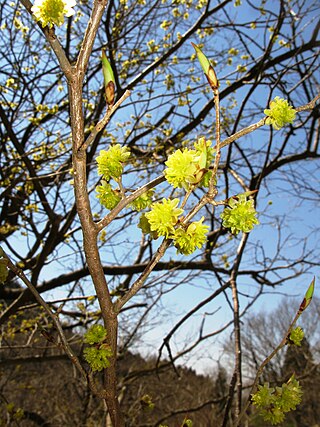
Lindera praecox, the February spicebush, is a species of flowering plant in the family Lauraceae, native to southern China, and Japan. A deciduous shrub typically 4.5 to 7.5 m tall, it is hardy to USDA Zone 8. In the wild it is found in thickets on the slopes of hills and mountains, and on the banks of streams and lakes. It is occasionally available from specialty nurseries.
















